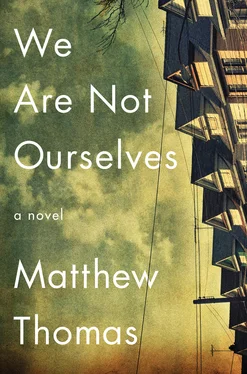One night, in bed, he asked her if he was dying.
“Not yet, you’re not,” she said. “You still have plenty of life left in you.”
“I’m scared,” he said. “I am dying.”
“We all are, in a sense.”
“I have a clock on me.”
“We all have a clock on us.”
“Not Connell,” he said. “Not yet.”
She wanted to say, Connell too , because it was the truth, but she saw how upset Ed looked.
“No,” she said. “Not yet.”
“I don’t want him to get this,” he said. “I want him to live in peace.”
She couldn’t help herself. “He may not get this and still not live in peace. There are no guarantees.”
“He’s not going to get it. Tell me that.”
“He’s not going to get it.”
Her answer reassured him enough to allow him to fall asleep. She lay awake for a long time thinking of the clock ticking toward its terminal moment.
Maybe Connell would get it. Maybe she would.
One never knew.
Now that was the truth.
• • •
Even the hospital wasn’t safe enough for some of the Alzheimer’s patients she’d seen over the years. Getting lost in the hallways or wandering naked out of their rooms was just the beginning. One man fell down the stairs and broke his back. Intake could be tragic. They came in with gashes, burns; once, a severed finger. She wanted to delay the onset of real symptoms as long as she could. The answer for that was drugs. There weren’t any approved drugs on the market, but there were drugs in clinical trial that might be helpful. She needed to get him into a research study. He would be helping the industry he had balked at working for, and he wouldn’t get a dime for it. She had once imagined getting a luxury car, foreign trips, and antique furniture out of the pharmaceutical industry; now all she wanted was a less-rapid diminishment of Ed’s besieged brainpower. She had to hope some clear-eyed pragmatist not immune to earthly rewards had expertly carried out the investigations Ed had refused to take up himself.
She called around to people she knew. She found an open study at the Nathan Kline Institute for Psychiatric Research, in Orangeburg, forty minutes away across the Tappan Zee Bridge. The study was to evaluate the long-term safety, tolerability, and efficacy of SDZ ENA 713 in treating outpatients with probable Alzheimer’s disease, and it guaranteed Ed a supply of the drug as long as he wanted it, until it was either commercially viable or abandoned in the United States.
After the initial evaluation she was given a stack of official forms, one of which was a “Capacity Assessment for Participation in a Research Study.” It indicated that the examining doctor had determined that Ed lacked the capacity to understand the purpose, risks, and benefits of the research and make an independent decision about participation. She knew it was a pro forma thing, that they needed her to sign with his power of attorney, which she had secured, but it rankled her, because Ed so clearly understood what they were telling him, probably understood it better than they did themselves.
Her heart ached when she signed the “Assessment of Capacity to Choose a Surrogate Decision Maker” form, because during the evaluation, the doctor had asked Ed who she was. “My wife,” Ed had said, as if there were nothing plainer.
“Do you want your wife to have the power to make decisions on your behalf?” the doctor asked with exaggerated deliberateness, as if to convey the gravity of what Ed was signing over.
Ed laughed and asked the doctor if he was married. The doctor nodded.
“Then it won’t surprise you to hear that my wife has been calling the shots as long as we’ve been married,” Ed said, and the doctor chuckled in husbandly sympathy before checking the box beside “This patient has the capacity at this time.” It amazed her how winning Ed had been able to be even at a moment like this.
She signed with a certain stoicism a form consenting to participate on his behalf, but it was the “Record of Choice of a Surrogate Decision Maker” form that nearly made her lose her composure, because it was the only one Ed had to sign himself, and he started his signature an inch above where he should have and angled it down and through the line in a way that made it look as if he was falling down as he did it.
Eileen keenly missed Curt, her hairstylist, and not just because he knew how to handle her cowlicks. She missed Curt’s entertaining conversation, the way he indulged her interest in politics and made her keep a toe dipped in the ocean of popular culture, the tide of which receded from her as soon as she stopped seeing him. Every time she checked out at the Food Emporium, it seemed, she recognized fewer of the faces on the covers of celebrity magazines.
She wasn’t about to go back to Jackson Heights for Curt, though, so she couldn’t avoid the hairstylist in Bronxville, even though it intimidated her to go in there. The salon was fancier than Curt’s place, with a miniature Japanese pond and leather seats in the waiting area. She was afraid to get into political conversations there, as she never knew who felt what, or who was listening, and she wouldn’t read any of the offerings on the coffee table— People, Us, Premiere, Entertainment Weekly —because she didn’t want to give anyone a reason to look down their noses at her, even though everyone else flipped through them with guilt-free relish. She couldn’t escape the feeling that there was a different set of rules for her that she’d never had properly explained.
The Bronxville salon was practically a full spa, offering nail care, massages, facial treatments. As stylists, they were skilled technicians, giving her what she asked for and leaving her a little cold. Her hair would look great for a couple of days, with a chilly perfection to it, the cut preserved so unchangingly that it looked as if she’d been fitted for a wig. Then, one morning a few days in, it would refuse to fall in line with the brush, and she would have to wait long enough until she could justify going in.
Curt gave her what she didn’t know she wanted. His cuts were understated; sometimes she wondered whether he cut much at all or just stood there talking and making snipping motions with the scissors. He always swept the shorn locks away before he took the smock off her, so she never got to examine the evidence. Weeks after an appointment, though, people were still asking her if she’d just had her hair done.
• • •
One day in the last week of March, when she was waiting to have her hair cut, she heard the woman before her — who despite being a little older than her was wearing stiletto heels and had alternating streaks of chocolate, caramel, and butterscotch dye in her hair — tell the hairstylist about the miracle they’d performed cleaning her mink at Bronxville Furrier after she’d leaned against some wet paint. Eileen saw the fur hanging on the hook. It looked shiny and full, as if it had just gotten a cut, shampoo, and blowout itself. The way the woman discussed her fur, it was as though she were actually discussing something else, speaking in a secret code that Eileen could decipher only if she had the corresponding key. She’d had the thought before that a fur might just be the thing to make her feel she belonged in this town.
A week later, when she walked past Bronxville Furrier and saw that they were having a spring sale, she went in and purchased a mink. It was so plush and full and enveloped her so thoroughly that she felt as though she had shrunk down to her teenaged size just by putting it on. In some quarters, it wasn’t so fashionable anymore to own a fur coat, what with all the work PETA activists had done to stigmatize the wearers of them, but fur seemed to still have a foothold in Bronxville. She had the two important things — money to buy it with, or at least a still-viable line of credit, and someone to go out with in it. Who knew how long either would last?
Читать дальше
Конец ознакомительного отрывка
Купить книгу












